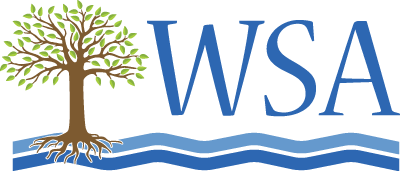Our DEIJ Journey
Periodic updates will be available here in the coming months. If you have any questions about how you can be involved, please do not hesitate to reach out to WSA’s DEIJ Committee.
A note from WSA’s DEIJ Committee
WSA’s DEIJ efforts require feedback from Stewards, partners, thought leaders, and contractors. We are grateful to those who took the time to help inform our equity journey thus far. Your candor and willingness to communicate with our consultants, staff, and board is invaluable in pointing out successes, avenues for growth, and areas where we must learn to do better. We have a long way to go before the principles of diversity, equity, inclusion, and justice can truly be said to be part of WSA's organizational DNA. As we continue our equity journey, please know how much we value your partnership and support.
-
WSA’s DEIJ Committee, led by WSA Program Coordinator, Noelle Chao, and WSA Chair and Vice-Chair, Frank Dawson and Carmera Thomas-Wilhite created a three-phase plan that includes:
Personal and organizational learning for the Board and Staff
Organizational and programmatic equity assessments and goal-setting
Stakeholder engagement and strategy implementation
-
Summer
With funding from the Chesapeake Bay Trust, the Keith Campbell Foundation and numerous donors, WSA hired two equity firms to provide assessment and strategic direction for our equity work.
Defensores de la Cuenca was hired in June 2021 to assess the Replant Anne Arundel program with the aim of improving equity in the contracting process and helping increase the number of Latinx communities we serve.
JIJ Impact was also hired this summer to:
Lead the Board and Staff through continued DEIJ learning
Assess WSA’s organization as a whole to identify opportunities for equity improvements
Assist the Board and Staff to clarify equity goals
Create strategies for achieving those goals
Fall
WSA Leadership shared a DEIJ Update.
In November, WSA partnered with Anne Arundel County Public Library to host an Environmental Justice panel in order to raise awareness about how environmental inequities across the watershed are being addressed. View our Resources page for more information.
-
Winter
WSA continued working with our DEIJ consultants, JIJ Impact and Defensores de la Cuenca on several exciting projects.
Jeff Johnson and Michael Ramsey worked with staff and board to develop a Vision and Values Statement for WSA. A small team worked on refining the organization’s new DEIJ Strategic Plan.
Abel Olivo of Defensores de la Cuenca developed a concept and outreach strategy for WSA’s new Tree Ambassador Program.
In February, Abel, Jeff, and Michael were speakers at plenary sessions for WSA’s Annual Conference.
Spring
WSA’s Board and Staff shared a letter with constituents, updating them on progress made by the organization over the past few months.
WSA’s Board approved the DEIJ Vision and Values Statement and the new DEIJ Strategic Plan.
With support from libraries, schools, congregations, County partners, and the Greater Baybrook Alliance, WSA Staff applied for grants to fund future projects in North and West County.
WSA presented on Hiring and Retention best practices to the new Anne Arundel Watershed Equity Initiatives Group, made up of representatives from local environmental organizations like Arundel Rivers, Severn River Association, and Unity Gardens.
Summer and Fall
In September, WSA received a large grant from the National Fish and Wildlife Foundation to help us connect with residents in Northern and Western Anne Arundel County. By partnering with key communities and gaining a better understanding of their needs and interests, we hope to design and implement Stewardship programs that will speak to residents in under-resourced parts of the county and dismantle barriers that have existed in our traditional offerings.
WSA Staff developed Data Collection Guidelines, with a particular emphasis on formalizing when and why we collect demographic information from our constituents. The data we gather will help us identify areas where we can improve as we work towards making our programs accessible and inclusive.
In Summer 2022, the Restoration Team launched the Tree Ambassador Program, a new initiative for Replant and our first bilingual training, providing stipends to individuals who bring trees to underserved areas with limited tree canopy. The first cohort started training in July and they led fall plantings in Brooklyn Park and the City of Annapolis.
Steward Candidates in Class 14 successfully completed WSA’s first capstone projects in Brooklyn Park, with plantings at the Brooklyn Park Library and Belle Grove Elementary.
-
Winter and Spring
WSA’s Certification Course invited Fred Tutman, the Patuxent Riverkeeper, to speak to the Steward Candidates about Environmental Justice. This session in January marked the first time that the class hosted a speaker on this topic.
WSA’s Annual Conference in March featured Pam Brown of the Partnership for Children, Youth, and Families, who raised awareness about poverty and inequities in Anne Arundel County. Another session featured speakers who spoke about local beaches, segregation, and water access.
WSA began working with Charles Brown and Xavier Lofton of Equitable Cities on the first phase of the NFWF grant. Although listening sessions and surveys were delayed, Staff continued to build community connections and refine the objectives of the Equitable Stewardship project.
Summer and Fall
WSA’s Groves of Gratitude progrm raised $2,275 for The Complete Player Charity, a local non-profit organization that provides extracurricular programs to empower underserved youth.
